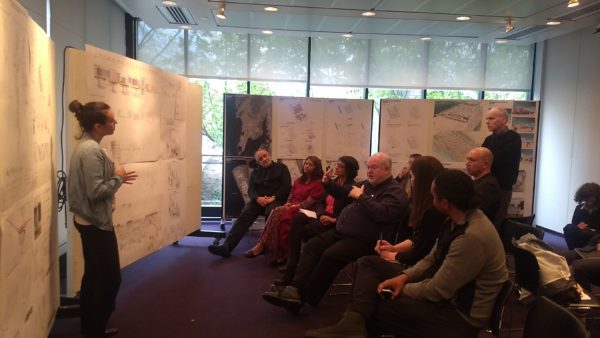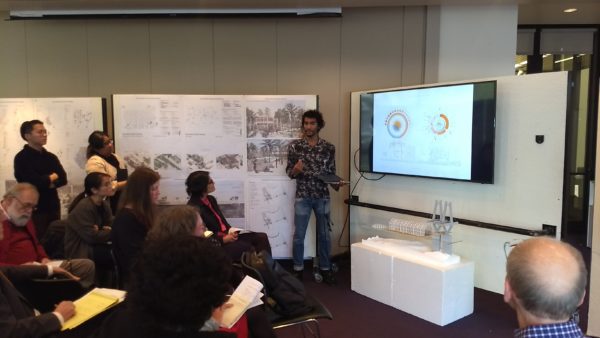
A student presents at the Final Review of the Option Studio.
Over the Spring semester, Professor Rahul Mehrotra of the Harvard Graduate School of Design challenged his students in an Option Studio to examine the sanitation infrastructure of Mumbai. They were given one ultimate goal: to build a wide-ranging strategy that would upgrade the indigenous settlements of the Koli or fishing community and integrate them into the broader urban system through sanitation infrastructure. In the process, the students learned how design and architecture of sanitation infrastructure can catalyze the improvement of indigenous communities and potentially the informal settlements in the city. Last week, the Studio culminated in a Final Review where students presented their projects to a panel of critics.
The critics, including Harvard faculty hailing from schools such as the Graduate School of Design and the Harvard School of Public Health, as well as an expert from Stanford, the Harvard Mellon Urban Initiative, and the Mittal Institute, who uncovered a larger conversation surrounding indigenous settlement, infrastructure and related issues which highlighted the need for and the value of multidisciplinary teaching and discussions. The students themselves, from across the disciplines at the GSD emphasized the value of diverse expertise when looking at a complex problem like urban planning and infrastructure: it takes more than one point of view to carry out a project with such depth and breadth.
In their discussion, the critics and students sought to reveal how sanitation infrastructure impacts the lives of the people in these settlements. Together, the range of expertise provided by each of the participants highlighted how the conversation must become something not simply between urban planners, but must encompass city officials, engineers, demographers, and others across a wide spectrum of fields in order to truly effect change in the areas that need it most. These individuals must come together to explore ideas that can enlighten the design of informal urban sites, and Professor Mehrotra’s Studio became a prime example of the work that can be accomplished with a multidisciplinary approach to a problem.

Student presentation in progress.
The Studio centered around the Mahim Koliwada, in Mumbai and the indigenous settlements of the Mumbai Metropolitan Region, which face the potential loss of their cultural identity. Without formal documentation to establish land rights, the settlements “have become encumbered with congested living conditions, and are in dire need of essential trunk infrastructure, which could become an enabler for a transformative process in bringing about dignity and improved health in the community,” Professor Mehrotra writes.
The location itself is composed of informal settlements occupied by the Kolis, “a fishing community that has a long lineage and are among the original settlers of the islands of Bombay,” said Professor Mehrotra. “The site sits at the head of the confluence of the Mithi River and the Mahim Bay, and in recent times the blockages and encroachments on the Mithi River have been attributed as the cause of flooding in the city of Mumbai.”
“Interestingly, adjacent to the site, exists one of the major sewage treatment plants for the city of Mumbai and, ironically, the settlements on the site next to this large piece of infrastructure have no direct access to sanitation,” continued Professor Mehrotra.
Throughout the course, the students mapped the settlements, analyzed the assets and deficiencies of the Mahim Koliwada community, identified potential areas of improvement, and developed design interventions that would support the creation of a more robust sanitation infrastructure. With a multidisciplinary direction, the students and critics have begun to uncover the many possibilities in the improvement of informal settlement infrastructure.
This Option Studio was the Aga Khan Studio at the GSD and was supported by the Urban Design Research Institute and the Aga Khan Development Network in Mumbai as well as the the Lakshmi Mittal and Family South Asia Institute.
